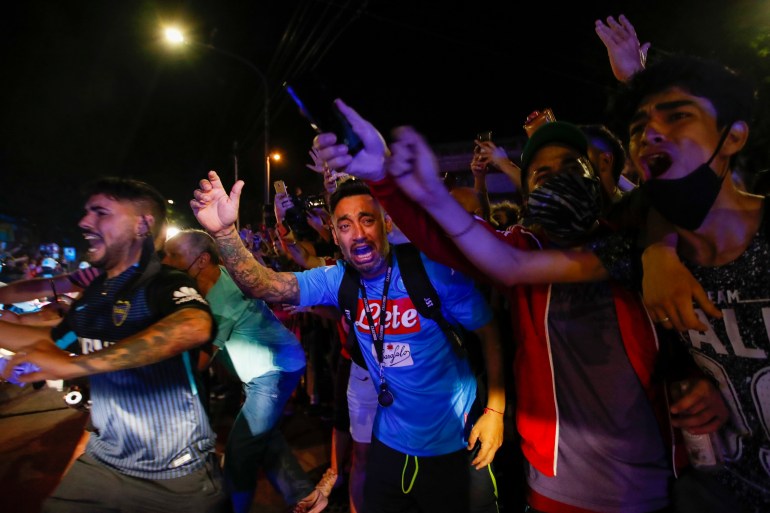Argentina mourns as Maradona’s coffin reaches presidential palace
Forlorn fans line up to pay their respects to the football icon as President Alberto Fernandez declares three days of national mourning.

Diego Maradona’s coffin has arrived at the presidential palace in Buenos Aires for a period of lying in state, TV reports showed, following the death of the 60-year-old Argentine football legend on Wednesday.
Hundreds of people were already lining up to pay their respects to Maradona, who died while recovering from a brain operation, the images from sport channels TyC and ESPN showed on Thursday.
Keep reading
list of 3 itemsDiego Armando Maradona, a life like no other in pictures
‘Eternal genius’: World mourns Diego Maradona’s death
Argentinians were plunged into grief by the death of the country’s favourite son, a sublimely gifted sporting hero they saw as “the most human of gods”.
The news fell like a hammer blow to a nation beaten down by months of economic crisis and the coronavirus pandemic, but one where football is seen as a panacea for all ills.

At 10pm local time on Wednesday, Buenos Aires exploded in cheers, horns, sirens and lights for the man who famously wore the number 10, after a viral social media message called for “one last applause”.
The homage resounded throughout the night in all the neighbourhoods of the capital, the AFP news agency reported.
At the Diego Maradona stadium, home to the Argentinos Juniors club where Maradona played as a child and made his debut as a professional player, fireworks were launched as a large crowd flooded into the field to the cry of “Maradooo, Maradooo”.
Earlier, fans searching for a place to grieve gravitated towards the Obelisk landmark in downtown Buenos Aires – and, of course, the Bombonera, the steep-sided cauldron of a stadium that is home to Boca Juniors, where Maradona’s genius was forged.
“I can’t believe it. It’s incredible. One thinks one gets through any storm, but no, everyone ends up being mortal. It feels like a bad dream. A joke,” Francisco Salaverry, 28, told AFP.
“Today’s a bad day. A very sad day for all Argentines,” President Alberto Fernandez summed up in an interview with sport channel TyC, after declaring three days of national mourning.
All around the city, the mourning had already begun as fans stood forlornly beside banners in homage to the legend, showing Maradona in his dashing prime.
Many of the banners simply said D10S, a play on the Spanish word “dios” for “God” that includes Maradona’s jersey number.
‘Wandering, dirty and sinful god’
If football is a religion in Argentina, then Maradona really was its god – especially for the founders of the Maradonian Church, a mostly internet-based group that uses religious language to venerate the player.
Approximately 1,000 people answered the “church’s” call for fans to gather in his honour at the Obelisk at 6pm local time, a traditional rallying point in central Buenos Aires for football celebrations.
“I prefer not to speak. I’m going to the Obelisk today,” said Guillermo Rodriguez, a lifelong fan who got a tattoo of his idol on October 30 to celebrate Maradona’s 60th birthday.

Rodriguez, 42, could not hold back his tears, saying he now knew he would never be able to fulfil his dream of hugging his idol.
“I’m totally shocked, grief-stricken,” said Gabriel Oturi, 68. “I’ll be honest with you. I thought he was a great guy who didn’t have very good people around him, who was taken advantage of a lot.”
“The first thing my 12-year-old son said to me was: ‘Mum, Maradona died.’ I couldn’t believe it. And I didn’t adore him particularly, but I felt sorry for him,” said Marcela Rodriguez, 52.
“Few times in my life have I felt the pain that invades me today,” wrote Maurico Passadore on social media, thinking about the famous World Cup tie against England in Mexico in June 1986, when Maradona scored the infamous “Hand of God” goal.
“Few times have I felt as much joy as that June 29, when we touched the sky with our hands, the same sky that today is darkened and fills us with tears.”
Some pointed out that Maradona died on the same date as his hero Fidel Castro, the Cuban revolutionary leader he referred to as his “second father”.
Maradona’s struggles with drugs throughout his career were part of what made Argentinians so protective of their hero.
An anonymous social media user went viral with a message saying Maradona “was a wandering, dirty and sinful god. The most human of gods”.